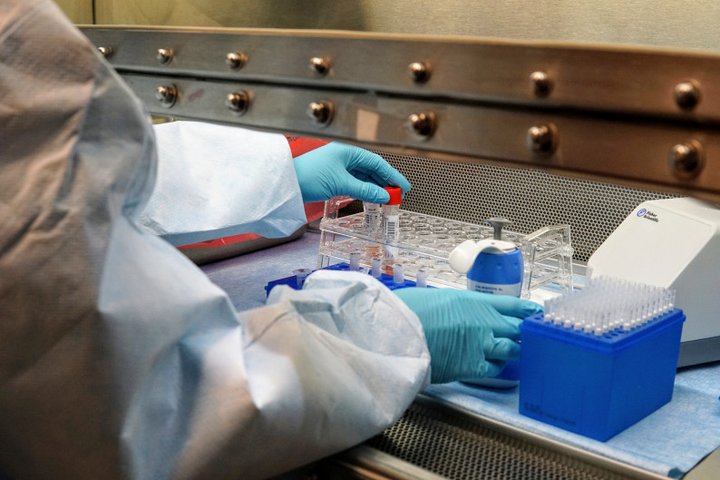
COVID-19 testing at San Francisco Department of Public Health laboratory. Photo by Tyrone Jue courtesy of San Francisco Department of Public Health
###
Even as California continues to add tests for the novel coronavirus to its arsenal — including 150,000 flown in from Hong Kong — tens of thousands of results are still pending, California Gov. Gavin Newsom said Wednesday.
Newsom reported that as of Tuesday, 66,800 tests for the novel coronavirus have been conducted in California. It’s a massive increase of 39,200 since Monday, because of improved reporting from public health, commercial, and university labs processing California’s tests.
“A lot of new providers, small labs, only submit positive tests, not just negative tests, and a lot of folks are sitting on paperwork,” Newsom said. “Over the course of last week, we’ve been scrubbing all of those and getting down into some of the smallest collection labs in order to make sure that everybody is on the same page. “
As of 10 a.m., 2,535 people have tested positive for the novel coronavirus in California. But even with limited testing, 48,600 results are still pending, according to the California Department of Public Health.
That adds one more delay to the list of backlogs slowing California’s testing efforts, which already included insufficient swabs, vials, and media for collecting patient samples, as well as a shortage of kits for extracting the virus’s genetic material.
“More is being done in that space,” Newsom said. “But let me acknowledge from the outset that 66,800 tests is not enough.”
Another 150,000 test kits are on their way to Oakland from Hong Kong via a 747 provided by Sir Richard Branson, the billionaire owner of Virgin Records and Virgin Air. And new technologies promise to speed the turnaround time on test results. One bedside assay recently approved by the Food and Drug Administration can return results in 45 minutes, but is not yet widely available.
Newsom mentioned another company that claimed to return results in 10 minutes, and said his team is checking it out carefully.
“We have a full-time task force just on testing protocols to vet these technologies and make sure that we’re not being taken advantage of,” Newsom said. “In this environment, there are extraordinary people, and there are people that do extraordinarily bad things.”
The state continues to add small gains in its search for 50,000 hospital beds still needed for an anticipated surge in patients. Seton Medical Center in Daly City, which was on the brink of closure and then leased by the state, is now operational, Newsom said. Seton will accept 220 coronavirus patients. St. Vincent Medical Center in Los Angeles, which the state is also leasing, should be functional and ready for 366 coronavirus patients soon.
California had already reopened Community Hospital in Long Beach, which added another 158 beds.
However, the USNS Mercy, a Navy hospital ship that is expected to arrive in Los Angeles on Friday, may have fewer beds than anticipated. It was originally expected to provide about 1,000 medical beds, but some of those are bunk beds and not adequate, so the number of beds available on the ship will likely be lower, Newsom said.
Some areas of the state may struggle more than others. The massive influx of patients sick with the novel coronavirus has filled an Intensive Care Unit at a Kaiser hospital in San Jose, forcing the hospital to repurpose another unit to take care of the regular ICU patients, Steven Parodi, associate executive director with The Permanente Medical Group, said in a livestream with the Journal of the American Medical Association last week.
Half of the patients at the Kaiser hospital are known or suspected to be infected with the virus, according to the livestream, which was first reported by the Los Angeles Times.
Legislators from the state’s Central Valley recently asked the governor to appoint someone from his response team as a liaison to rural communities, many of which already struggle with overburdened health systems.
“We believe that the San Joaquin Valley merits particular attention in the midst of this pandemic, in light of our historic health care access issues and low provider-to-patient ratios,” they said in the letter.
One reason for the ramped-up search for additional hospital beds could be that the rate at which coronavirus cases are increasing is faster than expected, Health and Human Services Secretary Mark Ghaly said at a press briefing today.
Originally, the state expected the rate of new coronavirus cases to double every six to seven days, Ghaly said. That’s changed. “We see cases doubling every three to four days, and we’re watching that trend very closely,” he said.
The state has yet to provide data to the public about the number of people currently hospitalized with the novel coronavirus, the number of people in the ICU, and the proportion of people testing positive for the virus. That data will help to keep refining these projections, Ghaly said.
But given current estimates, Ghaly said officials believe 50,000 hospital beds will meet the surge anticipated in a week or two, or possibly longer if social distancing successfully slows the spread of the virus. Whether the state will actually need all 50,000, he said, “is in large part up to us. That personal responsibility with physical distancing is going to be critical, and we’re going to be watching that closely.”
Still, Newsom said the shelter-in-place order is not likely to be lifted soon. “Don’t think for a second that we’re a day or two away from lifting that order. We’re not. We’re not even a week or two away.”
###
CalMatters reporter Ana B. Ibarra contributed to this report. CALmatters.org is a nonprofit, nonpartisan media venture explaining California policies and politics.
CLICK TO MANAGE